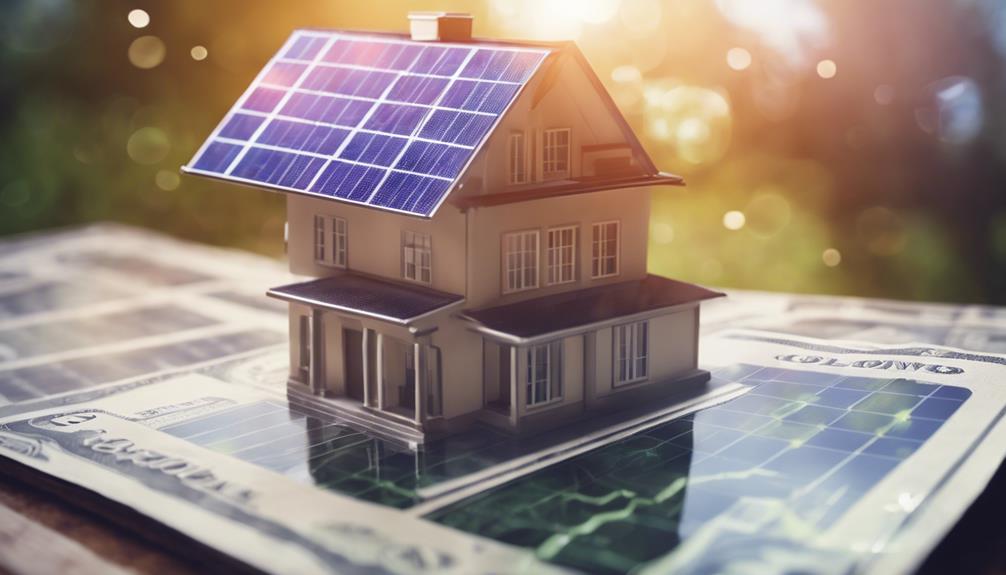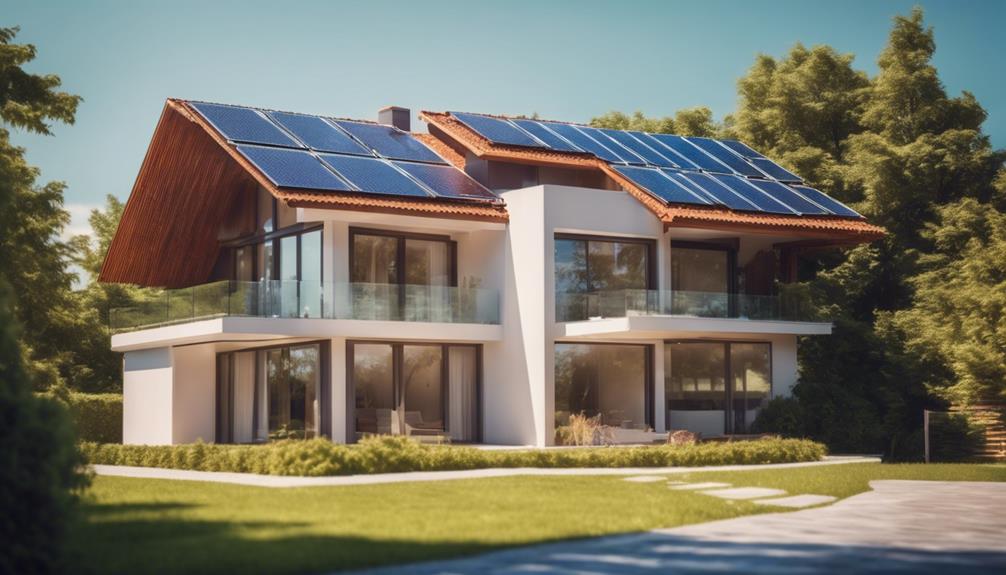What Are the Advantages of Solar Panel Roofing?
Intrigued by the financial and environmental benefits of solar panels on roofs? Explore how this sustainable solution can transform properties.
Solar panel roofing offers a wide range of benefits, including saving money, promoting environmental sustainability, and boosting property value. One of the biggest perks is the reduction in electricity bills. When solar panels are properly sized and installed, they can significantly cut down or even eliminate monthly utility costs. Over time, these savings can offset the initial installation expense, making it a smart financial move.
Solar panels are also incredibly durable. Unlike traditional roofing materials, they are built to withstand harsh weather conditions and protect your roof from the sun’s damaging rays, which can extend the lifespan of your roof. This can save you money on maintenance and replacement costs as well.
Another advantage is the increased energy efficiency. Solar panels capture more sunlight than traditional setups, leading to higher energy production. Plus, they require minimal maintenance; usually, just a periodic cleaning is enough to keep them running efficiently.
What Are the Environmental Benefits of Solar Panels Roofing?
Using solar panels on your roof offers a range of environmental benefits, paving the way for a cleaner and more sustainable future. By producing electricity from sunlight, solar panels cut down on the need for fossil fuels, thus lowering greenhouse gas emissions like carbon dioxide and methane. This reduction is crucial in slowing climate change and its related effects.
Solar panels also help improve air quality. Unlike traditional power plants that burn fossil fuels, solar energy systems don’t release harmful pollutants such as nitrous oxides, sulfur dioxide, and particulate matter. These pollutants can lead to respiratory and cardiovascular diseases, so their absence makes solar energy a healthier choice for communities.
In addition, solar panels decrease our reliance on non-renewable resources. Fossil fuels like coal, oil, and natural gas are limited and their extraction and use can harm the environment. Solar energy, being renewable, provides a sustainable solution that can be tapped indefinitely without depleting natural reserves.
Lastly, solar panels are built to last, often exceeding 25 to 30 years with minimal upkeep. Their long lifespan ensures a steady supply of clean energy, making solar roofing an essential part of a sustainable energy strategy.
What Are the Main Benefits of Solar Panel Roofing?
Apart from the clear environmental perks, solar roofing panels bring a host of benefits that make them a smart choice for homeowners. One of the biggest benefits is the significant cut in electricity bills. When sized correctly, these solar systems can greatly reduce or even wipe out your monthly electricity expenses, leading to long-term savings.
Another great thing about solar panels is their durability. Built to handle tough weather, they also shield the roof underneath. This added layer of protection can extend the life of your roofing materials, meaning fewer repairs and replacements down the road.
Solar roofing panels are also great for boosting energy efficiency. Roof-integrated solar setups tend to soak up more sunlight compared to traditional ones, generating more energy. This efficiency translates to better performance and higher energy output.
Plus, solar panels don’t require a lot of upkeep. Usually, they just need some periodic cleaning and occasional check-ups to keep running smoothly. This low-maintenance nature makes them an easy addition to any home.
And let’s not forget, that installing solar panels can significantly bump up your property value. Homes with solar energy systems often appraise higher and sell quicker, offering a compelling reason for homeowners to think about resale.
Why Is Solar Panel Roofing a Good Investment?

Investing in solar panel roofing is a smart move because it can lead to significant savings and boost your home’s value. By harnessing sunlight to generate electricity, you can cut down or even eliminate your electricity bills. In some areas, you can sell excess energy back to the grid, creating an extra source of income. Plus, there are government incentives and tax breaks that make switching to solar more affordable.
Installing solar panels also makes your home more attractive to buyers. Research shows that homes with solar energy systems tend to sell faster and for more money. On average, solar panels can bump up your property’s value by around 4.1%, with some buyers willing to pay an extra $15,000 for a home with solar power.
Solar panels are pretty low-maintenance and durable, often lasting 25 to 30 years with little upkeep. They also protect your roof from weather elements like rain, snow, and debris, which can help extend the life of your roof. With the growing focus on sustainability and energy independence, solar panel roofing stands out as a wise and profitable investment for homeowners.
When Do The Benefits of Solar Panel Roofing Start to Outweigh the Costs?
The benefits of installing solar panel roofing usually start to outweigh the costs when the energy savings and income from selling excess power cover the initial installation expenses. Generally, the payback period for solar panels is between 6 to 10 years. This can vary based on factors like where you live, local electricity rates, government incentives, and the size and efficiency of your system.
Several key factors influence this timeline. How much sunlight your area gets and the availability of state or federal tax credits, rebates, and incentives can significantly reduce upfront costs. Net metering policies, which let homeowners sell extra electricity back to the grid, can also help you reach the financial break-even point faster.
Energy savings aren’t the only benefit. Solar panels can also increase your home’s value. Research shows that homes with solar panels tend to sell faster and at higher prices than those without. This bump in property value can be a crucial factor when figuring out your overall return on investment.
Additionally, solar panels are durable and require minimal maintenance, contributing to long-term savings. Combining energy savings, government incentives, and increased home value makes solar panel roofing a smart investment over time.
Which Homes Benefit Most From Solar Panel Roofing?

Homes that get a lot of sunlight and have roofs facing the right direction benefit the most from solar panels. If your roof faces south and has a slope between 15 and 40 degrees, you’re in a great spot because these angles capture the most sun throughout the day. Even east and west-facing roofs can work well since they catch the morning or afternoon sun. On the other hand, north-facing roofs don’t get as much direct sunlight, making them less ideal.
Where you live also matters. If you’re in a sunny place like the southwestern United States, you’ll get more out of solar panels. But even in areas that aren’t as sunny, new advancements in solar technology can still make it a smart investment.
Having minimal shading from trees, buildings, or other structures is also crucial. Less shade means your panels can work at their best, generating the most energy possible.
Frequently Asked Questions
How Long Do Solar Panels Typically Last?
Solar panels typically last between 25 to 30 years. Over this period, they continue to generate electricity efficiently, though their energy output may gradually decline. Proper maintenance can further extend their operational lifespan.
What Is the Installation Process for Solar Panel Roofing?
The installation process for solar panel roofing involves evaluating your roof’s compatibility, designing the system, obtaining permits, installing mounting equipment, positioning the panels, wiring the system, and finally, inspection and activation to guarantee peak performance.
Are There Any Government Incentives for Installing Solar Panels?
Yes, government incentives for installing solar panels often include tax credits, rebates, and grants. These programs, varying by region, can greatly reduce the initial investment cost, enhancing the financial viability of solar panel installations for homeowners.
Can Solar Panels Work During Cloudy or Rainy Days?
Yes, solar panels can work during cloudy or rainy days. While their efficiency is reduced due to lower sunlight, they can still generate electricity. Modern solar panels are designed to work under various weather conditions, ensuring continuous power generation.
What Are the Financing Options Available for Solar Panel Installation?
Various financing options for solar panel installation include solar loans, leases, and power purchase agreements (PPAs). Additionally, federal and state incentives, such as tax credits and rebates, can substantially offset the initial costs.
